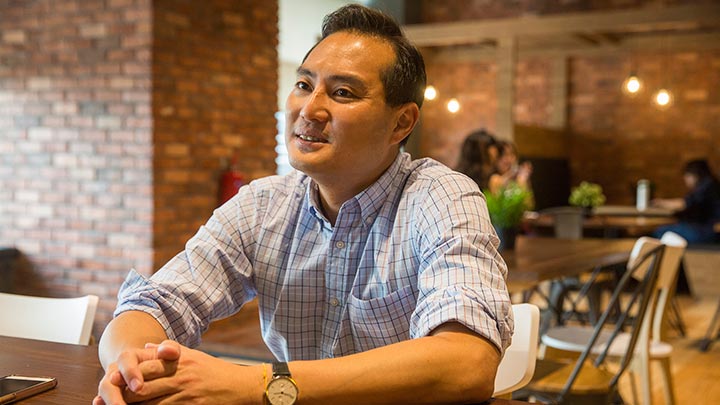Sharpening Singapore’s Digital Edge, Powered by Partnership

Merging two organisations can be quite an upheaval. Mr Tan Kiat How, Chief Executive of the Infocomm Media Development Authority (IMDA), would know.
Amidst a global landscape where the media and info communications sectors increasingly converge, the former Infocomm Development Authority (IDA) and Media Development Authority (MDA) merged in October 2016 to become the IMDA. The new agency’s mandate: to help local media and infocomm enterprises become more relevant and better equipped to seize new opportunities.
The merger of the two organisations posed many challenges, he admits. Roles were restructured; staff from the two entities had to get to know one another better and work more closely together. But the reorganisation was also a good time for “a strategic pause”, to “ask some fundamental questions”, says Mr Tan.
“I always challenge my colleagues to ask: are we relevant? What happens if we were to shut down? What loss is there to the government or to Singapore?”
In Mr Tan’s view, such questions are a crucial exercise for any organisation. “When you think about extreme scenarios, having to answer those questions, it gives a sharper sense of mission, purpose and ambition.”
These questions imbued the IMDA with a renewed sense of purpose as it charted its strategic direction as a newly formed agency.
Singapore is well-poised to seize new opportunities in the digital economy, Mr Tan says. With the convergence of infocomm, data and media, the IMDA is “uniquely positioned to support our nation in riding the digital wave, enabling our economy and society to embrace technology for an exciting future”.

By merging media and infocomm functions, and as both industry developer and regulator, the IMDA is able to see all aspects of the sector and offer greater seamlessness, he adds.
Research and development, pro-innovation policy regulations and standards, advanced physical and digital infrastructure – these are important enablers to make that quantum leap forward.
“Most importantly, our people will be Singapore’s key differentiator in this digital future.”
For Mr Tan, this transformation within the IMDA is also symbolic of the broader digital transformation that the IMDA, along with other agencies across Government, wants to achieve for Singapore.
The SG: Digital Movement
At the inaugural SG: Digital Industry Day in May, Minister for Communications and Information, Mr S Iswaran shared how the Digital Economy Framework for Action demonstrated the ways that industry players can participate in Singapore’s digital transformation journey.
The IMDA has identified two areas of focus in the near-term: supporting and driving Singapore as a digital economy, and building a digitally-ready society.
Mr Tan recalls a comment he heard at a forum: “There is no such thing as the digital economy. It is the economy. If you are not digital, you are passé.” That resonated with him. “Everything is moving and transforming. We must not be left behind.”

One of the IMDA’s key objectives is to support every business in Singapore, regardless of size, in their journey to become a digital business, and help workers feel empowered by technology. “Rather than being concerned only about automation taking over jobs, the focus should be on how do we ensure better jobs for them, enabled by technology?” Mr Tan says.
“We need to really believe in it – going digital is not just for the data scientists, or the financiers who learn about fintech; it’s also every part of the workforce’s ability to update their capabilities, to have better quality jobs.”
At the same time, society as a whole must be engaged. “How do we ensure all citizens have the digital skills to use technology to improve their lives?”
This means going to the ground to work with community organisations, schools and more, to introduce technology to seniors, low-income earners and people with disabilities.
Another key tenet of Singapore’s digital transformation is the protection of personal data. Mr Tan, who is also Commissioner of the Personal Data Protection Commission (PDPC), says the commission is complementary to many areas of the IMDA’s work.
“Data and data flow are the lifeblood of a digital economy, but at the same time, there are important considerations,” he says, highlighting recent news of possible breaches of personal data by social media platforms.
Beyond its regulatory role, the PDPC also has the important function of looking at how to generate and capture value in the broader data ecosystem, he adds.
Change from within
Even as it works on Singapore’s digital transformation, the IMDA is undergoing an internal evolution as well.
One has been with a collaborative project to drive awareness and adoption of digital TV. It has seen various parts of the organisation come together, working among themselves and with external stakeholders such as retailers and community partners to run awareness campaigns, prepare and deliver starter kits, and ensure that people are ready for the switch.
Mr Tan is “gratified” with how his IMDA colleagues have come together. He acknowledges that this “Team IMDA” culture will take time to coalesce – and a new shared office space, with its co-working and communal areas, will play a key role in this as it brings the entire organisation under a single roof. “The way we design this physical space, the new office [at Mapletree Business City], is very much in that spirit,” he says.
On a more personal level, Mr Tan encourages his staff to take time to reflect on ways to improve themselves, whether at work or at home. His own resolution for the year: embark on a leadership awareness programme.
The self-professed introvert is also making a more conscious effort to engage his colleagues. “It’s not easy because we don’t often look into a mirror,” he says, but asking the deeper, harder questions – What value do I bring? What does the IMDA stand for? What does success look like? – is an exercise in honesty and self-awareness that is critical for change.

What’s in your cuppa?
Kopi-O
How often do you have it?
Two to three times a day
- POSTED ON
Aug 16, 2018
- TEXT BY
Sheralyn Tay
- PHOTOS BY
Norman Ng
-
Out of Office

Tantalising Tastebuds, Transforming Lives









